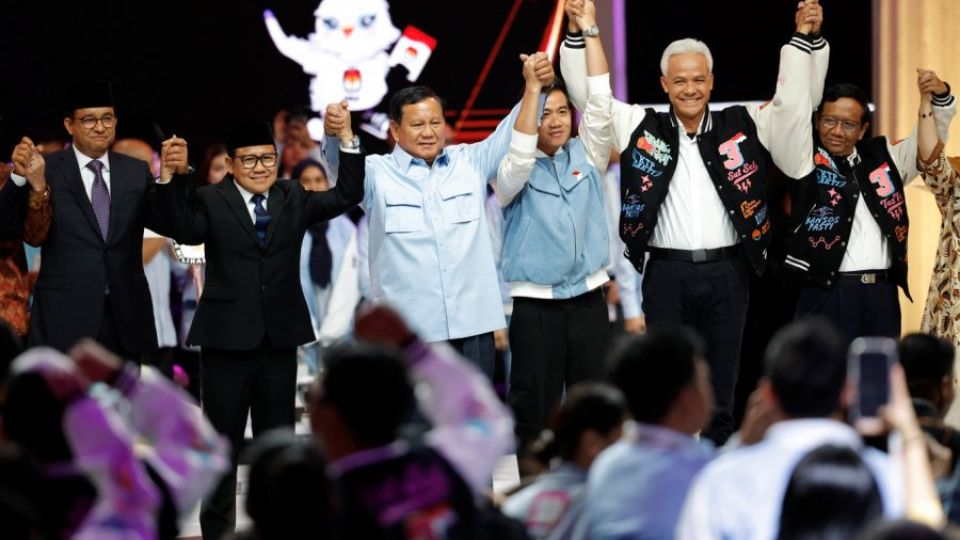February 5, 2024
JAKARTA – With voting day just 10 days away, the 2024 presidential candidates struck a more conciliatory tone in their final televised debate on Sunday, as they addressed issues of education, health, human resources, culture, information technology, social welfare and policy inclusiveness.
The fifth electoral debate of the campaign season, held at the Jakarta Convention Center (JCC) in Central Jakarta, was the third and final such encounter of presidential candidates Anies Baswedan, Prabowo Subianto and Ganjar Pranowo before voters go the ballot boxes on Feb. 14.
Unlike the previous two presidential debates, which featured tense and sometimes heated exchanges between the candidates, the final debate saw front-runner Prabowo regularly praise Anies’ proposals and give nods to many of Ganjar’s proposals, from the realm of education to the protection of migrant workers.
Prabowo said he “very much” agreed with Anies when the latter said educators were key to achieving the country’s education goals and that he would seek to accelerate teacher certification, employ temporary teachers on government contracts and provide scholarships for their children.
“It’s no wonder, as he used to be education minister,” Prabowo said.
Ganjar found common ground with Anies as well, emphasizing the need to improve teachers’ welfare and ensure inclusivity in the national education system. Anies responded by thanking Prabowo and Ganjar for agreeing with him.
Ganjar also received positive responses from his rivals when he highlighted the importance of the state’s role in protecting migrant workers abroad, from the regional administration level to the Foreign Ministry.
“This commitment is not hard. As long as we have the right data and instruments, all problems can be solved in no time,” the former Central Java governor said.
Anies, agreeing with Ganjar, added that the government should work with activists who had a better grasp on the challenges migrant workers faced, while Prabowo said all candidates shared “the same commitment” to the protection of migrant workers.
Shift in tone
Although Prabowo and Ganjar sparred over the issue of malnutrition – including the distinction between malnutrition and stunting and how to address both – the tone of the final debate was much less heated than many of the previous encounters.
In the first debate, the candidates traded barbs on the hot-button issues of law, corruption, human rights, democracy and governance, with Anies attacking Prabowo over his choice to name President Joko “Jokowi” Widodo’s eldest son, Gibran Rakabuming Raka, as his running mate.
Gibran joined Prabowo’s ticket with the help of a controversial Constitutional Court ruling that altered the age requirements for certain candidates. An ensuing ethics inquiry into the circumstances of the ruling led to the removal of Gibran’s uncle, Anwar Usman, as the court’s chief justice.
The second presidential debate saw Anies and Ganjar team up to attack Prabowo on issues of international relations, defense and security – all topics close to Prabowo, the current defense minister. Anies gave Prabowo a score of 11 out of 100 for his performance as a defense minister while Ganjar gave him 5 out of 10, visibly angering the Gerindra Party chairman.
In his closing statement in the final debate, Prabowo apologized to his rivals on behalf of himself, his running mate Gibran and his coalition for the barbs that had been traded ahead of the Feb. 14 election.
“I come with goodwill. I think all three candidates just want the best for the people of Indonesia. If, say, there were things we said or did that were displeasing, I would like to apologize,” he said.
“I consider Anies-Muhaimin and Ganjar-Mahfud my brothers,” Prabowo said, adding that the real enemy of Indonesia was poverty and starvation, not people with political differences.
Playing it safe
Experts felt the last debate was anticlimactic compared to the heated third debate but that it was understandable for the candidates to play it safe in their final bout.
“Prabowo was surely trying to avoid any blunders to be able to win the election in a single round,” political analyst Kennedy Muslim of Indikator Politik Indonesia told The Jakarta Post on Sunday.
“Meanwhile, Anies and Ganjar might have realized that the explosive third debate was counterproductive for their campaign as surveys showed that the majority of the public did not see their [attacks on Prabowo] kindly,” he added, noting a “sympathy bump” from some social media users toward the defense minister.
Education observer Ina Liem told the Post that much of what the candidates said still sounded vague, with few concrete solutions to solve issues of education inequality, in line with an evaluation by the Association for Education and Teachers (P2G).
“This debate has yet to touch the fundamental issues of national education,” the association said in a statement.
State of the race
Despite what analysts claimed was a weak outing for Prabowo in the third debate, he remained the front-runner in the following weeks.
The Prabowo-Gibran ticket is still leading public opinion polls, with a survey conducted by Indikator Politik from Jan. 10 to 16 showing the pair enjoyed 48 percent of voter support.
Anies and Ganjar were neck and neck in second and third place with 24 and 21 percent of voter support, respectively. The pollster also reported that 5.6 percent of respondents were undecided and that the survey had a margin of error of 2.9 percent.
It has been widely speculated that Anies and Ganjar are considering forging an alliance in the case of a runoff vote, particularly with their supporters seemingly united on social media through the Four Fingers movement, which calls for a fair election and is against abstentionism.
Political researcher Noory Okthariza of the Centre for Strategic and International Studies (CSIS) said it was still possible that opinion polling would shift in the days ahead.
“The candidates’ performances during the debate could still sway public opinion, especially for undecided voters, who account for around 25 percent of total voters, according to some pollsters,” Noory told the Post.


